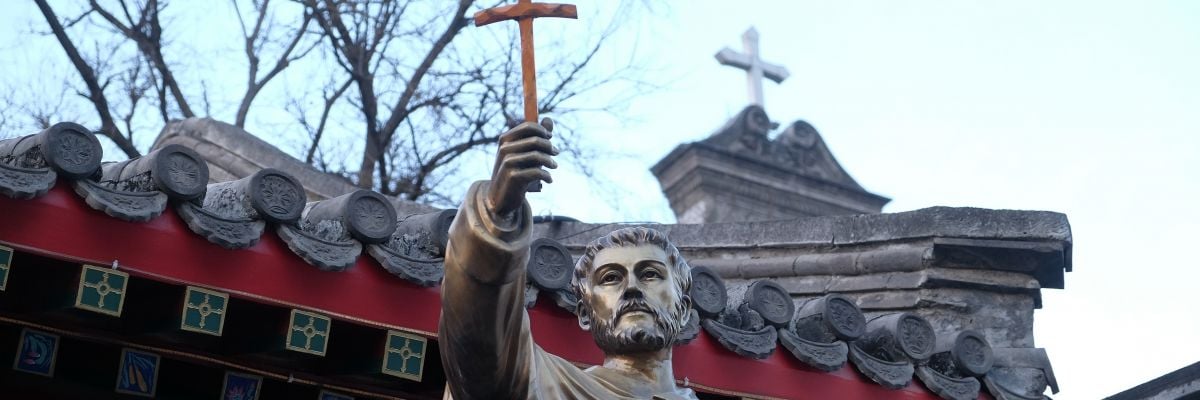
Stunned by the rapid advance of the Protestant Revolution, the Church began its much-needed reform with the ecumenical council at Trent (1545-1563). The council that would lay the foundation for the Catholic Reformation followed another important development, when in 1540 Pope Paul III approved the Society of Jesus. The Jesuits, as they would be called, began their work several years prior in Paris, when Ignatius Loyola and several companions (including Francis Xavier) pledged to live the evangelical counsels (poverty, chastity, obedience) and to go to Rome and place themselves at the service of the pope.
Ignatius envisioned his new order would participate in the reform of the Church by focusing on education (catechesis) and encouraging the laity to participate frequently in the sacraments, especially confession and the Eucharist. This focus led to a multitude of Jesuit teachers and missionaries serving in heavily Protestant territories and in far-flung places of the world that had never heard the Gospel, all to win souls for Christ.
Although the Jesuit formation process was long and life in the Society was difficult, men joined by the thousands. The Society established universities throughout Christendom in order to form both members of the order and Catholic laity to participate fully in the Catholic Reformation. The small group began by St. Ignatius and his companions became a powerful and influential element within the Church and Christendom within a century of the founder’s death in 1556. By the eighteenth century, there were over 20,000 Jesuits running nearly seven hundred universities, colleges, and seminaries. The Society contributed to the prestige of secular rulers and the papacy but its influence was not universally appreciated. Anti-religious intellectuals and absolutist-minded monarchs became wary, envious, and ultimately opposed to the Jesuits.
René Decartes’s (1596-1650) philosophical writings, likely without his intent, sparked a movement opposed to the Church and its understanding of philosophy. By the eighteenth century, the “age of reason” and “enlightenment” produced a crop of thinkers, writers, and politicians radically opposed to the Church and its influence in the world. François-Marie Arouet (1694 – 1778), known by his pen name Voltaire, was one such individual. Although educated by Jesuits, Voltaire embraced anti-Catholic beliefs and worked tirelessly to destroy the “infamous thing,” his moniker for the Church. Voltaire recognized the only way to limit the Church’s influence and bring about a secular society was to take control of the institutions of higher learning in Europe, which required the destruction of the Jesuits. He boasted that with the Jesuits defeated, “there will be nothing left of the Church.” In order to further their agenda, Enlightenment thinkers began a concerted campaign against the Society of Jesus.
Many secular rulers were wary of the Jesuits due to their outsized influence and their independence. Jesuits were fiercely loyal to the pope, whom many kings saw as a foreign prince intent on meddling in their internal affairs. As these monarchs focused on creating a centralized state, they increasingly saw the Jesuits as an obstacle to their plans. Frustrated and irritated by the Jesuits, several secular rulers in the eighteenth century placed intense political pressure on the Roman pontiffs to do something about the meddlesome Society. However, these rulers did not wait for papal activity, as many began their own campaigns of suppression and expulsion.
King Joseph I (r. 1750 – 1777) desired to reform Portugal so that it could be a leading power in Western Europe. He placed great power and authority in the hands of Sebastião José de Carvalho e Melo, known as the Marquis de Pombal, in order to accomplish this task. Believing the Jesuits to be a threat, Pombal began a concerted propaganda campaign directed at creating a negative image of the Jesuits in the minds of the king and the Portuguese people. In 1759, Pombal convinced the king to sign a decree denouncing the Society and ordering their expulsion from Portugal and its overseas territories.
The next attack on the Society came from France, the “Eldest Daughter of the Church.” The Paris Parlement, the most important of thirteen provincial appellate courts charged with registering and approving royal decrees, initially restricted French subjects from entering the Society and banned Jesuits from teaching theology, then prohibited citizens from attending Jesuit schools. The Parlement’s anti-Jesuit declarations culminated in 1764, when King Louis XV (r. 1715-1774) signed a decree expelling the Jesuits from France and its dominions.
Recognizing the serious threat to the Society and the Church as a whole posed by such attacks, Pope Clement XIII (r. 1758-769) defended the Society its role and mission in the Church in the bull Apostolicum pascendi in 1765. Despite the papal defense, the attack on the Society from European secular rulers continued. In Spain, Ignatius’s nation of origin, the Jesuits came under fire from Bernardo Tanucci, a chief minister and advisor in Naples to King Charles III (r. 1759-1788). Tanucci despised the Jesuits and the Church and continually sought to limit the power and influence of both. He convinced the king to order the expulsion of all Jesuits from Spain and its colonies in 1767.
In only twelve years, the Society was ruthlessly persecuted in three countries where it had been highly effective and influential. The Jesuits, once the champions of the Catholic Reformation and a powerful and prominent group within the Church and Europe, were dazed and weakened, but their greatest defeat was yet to come.
Giovanni Vincenzo Antonio Ganganelli was educated by the Jesuits as a young man and discerned a religious vocation. He entered the Conventual Franciscans in 1723, taking the religious name Lorenzo. He was ordained to the priesthood and pursued advanced academic studies, earning a doctorate, and teaching at a university. Pope Clement XIII, who had befriended Fr. Ganganelli, made him a cardinal at a time when the Jesuit controversy dominated the pontificate. The conclave to elect Clement’s successor met in the face of a formal request from the rulers of Portugal, France, Spain, and Naples to suppress the order.
Several cardinals believed suppression was the only viable alternative to bring peace between the Church and those kingdoms. There was much debate within the conclave but eventually the cardinals elected Ganganelli, who took the name Clement XIV (r. 1769-774). Clement XIV hoped to resolve the Jesuit question peacefully but was under intense political pressure throughout his pontificate. After a failed attempt to placate the anti-Jesuit secular powers through harsh measures against the Society, he issued the brief Dominus ac Redemptor on July 21, 1773, which formally suppressed the Society of Jesus.
It was, as historian Eamon Duffy wrote, “the papacy’s most shameful hour.” Clement partially blamed his action on the Society itself for sowing seeds of dissension and discord among secular rulers and other religious orders. Sadly, the pope ordered the arrest and imprisonment of the Superior General of the Society, Lorenzo Ricci, in Castel Sant’Angelo, where he later died. Clement XIV’s action against the Society left such a significant blot on the history of the papacy that no pope since has taken the name Clement.
Although the suppression was universal, there were areas where the Jesuits continued to operate unimpeded (especially in areas with non-Catholic monarchs). The monarchical world was turned upside down by the creation of the United States and the French Revolution in the late eighteenth century. Desperate to revive Catholic higher education and reigning during a time when the Church no longer faced opposition from the same secular authorities that clamored for the Society’s suppression, Pope Pius VII (r. 1800-1823) re-established the Jesuits on August 7, 1814. Once more, the sons of Ignatius were allowed to operate universities, colleges, and undertake missionary adventures.
The forty-one years of suppression were a dark time in the history of the Society, but the vision of St. Ignatius and his companions could not be forever dimmed.



